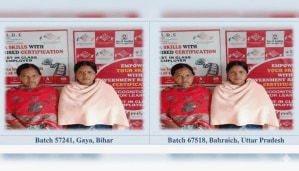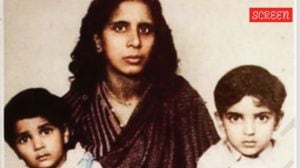The DMK, a vocal opponent of the Centre’s National Education Policy (NEP) “imposing” a uniform curriculum, now finds itself in a controversy over its government’s apparent attempt to do the same in Tamil Nadu.

The issue
The TANSCHE had sent out a circular in March, saying while autonomous universities could decide 25% of their syllabus, 75% of the curriculum would have to be uniform across the state. The government and colleges had since been negotiating. However, after the Higher education minister K Ponmudi last week appeared to harden his stance, outrage is growing.
Teachers have launched a signature campaign in universities and colleges, besides planning demonstrations across the state on Friday. They are also planning to lodge their protest by paying back their DA and TA allowances to TANSCHE on July 25. The movement has the support of the teachers’ unions of top universities such as Madurai Kamaraj, Manonmaniam Sundaranar, Mother Theresa, and Alagappa.
Universities and colleges say that the syllabus, prepared by bureaucrats and slated for immediate implementation, is riddled with errors, and that imposing a uniform curriculum on autonomous institutions is unfair. They have also pointed out that forcing a common syllabus is in stark contrast to the stance the DMK has taken against NEP.
The government’s stand
Ponmudi, a vocal critic of the NEP, is leading the implementation of Tamil Nadu’s new uniform curriculum.
The higher education minister — currently facing an ED probe — last week said colleges in the state should follow the same syllabus since all students studied in the same language, and especially in science subjects, essentially the same matter. He advocated uniformity in Arts courses too.
Story continues below this ad
This came after TANSCHE, in one of their recent negotiation meetings with academicians, claimed that what was sent to the universities was only a “model syllabus” and not a “common syllabus”, and it was the prerogative of the respective universities to accept or reject it.
When contacted, a top source in the state higher education department said the TANSCHE had sent reminders on Tuesday to universities to submit reports about the status of the new uniform syllabus implementation.
Claiming that the decision for a uniform syllabus had come from the “highest levels” and admitting that it was drafted and implemented under the watch of bureaucrats, the official said some of the universities, including Bharathiar University and Bharathidasan University, had already voiced their reluctance.
“They can modify 25% of the syllabus considering the local cultural, socio-economic requirements,” the official said.
Story continues below this ad
Academicians’ objections
In Tamil Nadu, 13 universities operate under their own special Acts, having their academic bodies like a senate, syndicate, academic council, and a board of studies to frame the curriculum. Critics argue that the introduction of a uniform syllabus encroaches on the autonomy of these bodies.
The Joint Action Council of College Teachers (JAC), in a statement, said even the world’s most developed and advanced countries in education don’t have a common syllabus.
The role of TANSCHE so far has been that of giving a framework or a skeleton of curriculum, which universities consider in the preparation of their own syllabuses. “For language subjects like Tamil and English, a Common syllabus cannot even be imagined,” the JAC statement said on Wednesday.
Story continues below this ad
Asking whether the Tamil Nadu government had held any consultation meeting before deciding to have a common syllabus, the statement said the syllabus serves no purpose but only brings in lots of troubles in higher education.
Arguing that the idea of a “common syllabus” is not legally tenable, the JAC statement asked what would be the role of more than 500 Boards of Studies in 13 universities if the TANSCHE was going to prepare the syllabus.
J Gandhiraj, president of the Association of University Teachers and Chemistry professor at a Chennai college, said the TANSCHE syllabus reduces practical hours from six to two per week for more skill-oriented subjects. “It’s alarming to witness a group of bureaucrats arbitrarily deciding on such matters when our universities have established Boards of Studies and experts, who consider subject specifics, technicalities, local factors, and industry availability while preparing the syllabus,” Gandhiraj said.
V Ravi, chairman of the Board of Studies at Periyar University and leader of the All India Federation of University College Teachers, said the TANSCHE is essentially forcing universities and their affiliated colleges to adopt a new syllabus riddled with errors. Ravi, a Botany professor, claimed, “The content is in no way related to the title, with different titles assigned to the same content, non-major elective papers included in the major list, and vice versa. For instance, one section begins with the title ‘botany,’ and the following page discusses ‘organic chemistry’.”
TN’s policy to counter NEP
Story continues below this ad
When opposing the NEP, the DMK had said Tamil Nadu would come out with its own education policy. Government officials clarified this common syllabus was distinct from that policy, which was in its early stages.
The exercise of framing the state policy has seen signs of troubles already. L Jawahar Nesan, member-cum-convener of the high-level committee constituted by the government in 2022 to formulate the State Education Policy, resigned last May, blaming T Udhayachandran IAS, a top official at Chief Minister M K Stalin’s office. While Nesan’s public statement blamed Udhayachandran for “threatening” and for “highly enraged” behaviour to make him “subscribe to the imposed conditions,” Nesan also alleged he was prevented from making the state’s alternative policy different from the NEP.
Why has DMK opposed NEP?
On different occasions, the DMK has said a common education policy for the country is a “fraud on the Constitution” as education is a state subject; gives more importance to Sanskrit over languages like Tamil; and is against the poorer sections of society.
“People who framed it had neither a long vision nor an elementary understanding about social justice. Entire policy is so detrimental to the progresses we gained over the decades, pushing our system back to a Stone Age with its problematic features that actually revives casteist jobs, essentially encouraging a carpenter’s son to become a carpenter. While coming out with such a policy that cancels all progress and developments we gained in education, they also aim to keep the state a mere implementing authority, a mute spectator. It is also an RSS plan you see, who are using this for a backdoor entry, essentially to erase the mother tongue, cultural diversities and diversity to make One India,” P Wilson, a DMK Rajya Sabha MP and a prominent face in the party’s legal wing, had said in 2021.








































